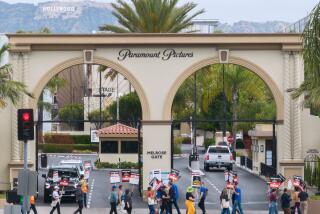Royalty Hike Jolts Producers
- Share via
The cost of producing plays in L.A.’s many sub-100-seat theaters just went up. If you’re presenting a Samuel French play, that is.
The 166-year-old Samuel French organization, which handles rights and royalties for more plays than any other licensing firm, previously charged producers in the professional sub-100-seat arena the same royalty rate as that charged to amateur groups--generally, from around $25 to $75 for the first performance and from $20 to $50 for subsequent performances.
Now, however, Samuel French has begun charging a flat fee of $75 per performance--with no distinction between opening night and later shows--for most productions operating under Actors’ Equity’s 99-Seat Theatre Plan (an only-in-L.A. institution). Although there may be occasional lower prices negotiated on a one-on-one basis, said Samuel French’s West Coast director Leon Embry, most producers will have to pay the new rate.
Producers and presenters are alarmed. Matt Chait, proprietor of the Complex group of theaters on Santa Monica Boulevard in Hollywood, is organizing a picket line that he hopes will go up Saturday at the Samuel French bookstores in Hollywood and Studio City.
In justifying the price hike, Embry referred to the special status of Los Angeles as center of the entertainment industry. Because the visibility of a show here might generate screen opportunities for it, playwrights or their agents personally oversee who gets the rights to their plays in L.A. (and in New York), more than in other cities. For Samuel French, Embry said, this requires more work in obtaining clearances from playwrights or their agents. “Sometimes there can be six letters and 12 phone calls,” Embry said--and Samuel French receives only a 10% to 20% commission for its work.
Also, Embry said, playwrights often feel they aren’t sufficiently compensated in L.A. There are so many sub-100-seat theaters here, and so relatively few larger productions, that most playwrights have to settle for sub-100-seat productions that give them royalties comparable to amateur productions in Podunk. They feel these sub-100-seat productions destroy their chances of moving up to larger L.A. productions, Embry said.
When told of Embry’s reasoning, Colony Studio Theatre producing director Barbara Beckley said she doubts “that a production in a small theater in Hollywood would impact the audience for that play at the Shubert or the Taper. And it’s stupid for playwrights to clamp down on their work because maybe they’ll get that cable deal.” She believes that only “unfettered production” will develop the L.A. theater scene.
The Samuel French price hike is quite a fetter, Beckley contended, calculating that it would add approximately $1,400 to the cost of a typical Colony run. If the rules remain in effect and she is unable to negotiate lower fees in individual cases, she said she would program Samuel French plays “only as a last resort.”
“I would have to concede that this will knock out some productions,” Embry said. “Maybe they’ll have to do more original plays [that is, before Samuel French or anyone else gets the licensing rights]. Maybe this will get some new and fresh writers up and running.”
But that wouldn’t be the only alternative. French’s primary competitor, Dramatists Play Service, has “no intention of raising the [L.A.] prices” for the plays it controls, said Craig Pospisil, director of the company’s nonprofessional rights. Picket line organizer Chait said he may distribute lists of Dramatists Play Service publications to prospective producers.
Several years ago, Dramatists did erase the difference between opening night and subsequent night royalties for new additions to its catalog, Pospisil said, but the rate for even hot new plays in the Dramatists catalog still isn’t at the $75 level. Pospisil agreed with Embry that requests for L.A. rights are more “time-intensive” than those in most cities, but he said he hasn’t heard that playwrights felt insufficiently compensated in L.A. Because writers are routinely consulted about L.A. productions, they can always just say no--withhold the rights, he said.
However, while playwrights may not have complained all that much, the idea of additional compensation for published plays--or of more new plays being done because producers can’t afford the Samuel French fees--”is not anathema to us,” said playwright Michael Van Duzer, who’s co-chair of the Alliance of Los Angeles Playwrights. “I feel bad when people have to pay more, but at the same time [higher royalties] might at least allow writers to write off their computers for a year.”
Van Duzer noted that Samuel French rates had remained fairly constant for the past 20 years (indeed, an article by a Samuel French executive in 1925 refers to a $25 per performance rate in effect then). And Van Duzer likes the idea of drawing a line between professional sub-100-seat productions and amateurs: “Certainly most of [L.A.’s smaller theater shows] are more professional than whoever is doing ‘Run For Your Wife’ in Boise.”
More to Read
The biggest entertainment stories
Get our big stories about Hollywood, film, television, music, arts, culture and more right in your inbox as soon as they publish.
You may occasionally receive promotional content from the Los Angeles Times.










